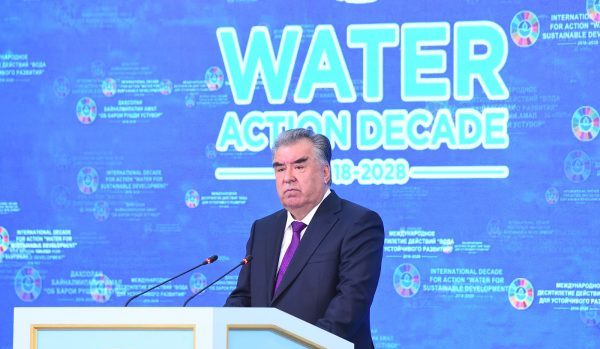Tajikistan ranks sixth in the world in the generation of environment friendly electricity
Tajikistan is one of the world’s leading countries in terms of greenhouse gas non-emissions.
Tajikistan and the Netherlands, as co-chairs of the 2023 Conference in New York with cooperation with the United Nations
Gajendra Singh Shekhawat, Minister of Jal Shakti from India participated in this conference
Dushanbe, June 06 Speaking at the opening ceremony he said that Tajikistan President has made significant contribution to linking the chain of regional and global events to the UN 2023 Water Conference to be co-chaired by the Republic of Tajikistan and the Kingdom of the Netherlands and also mark 20th anniversary of joint efforts to promote the United Nations Water Agenda.
The Dushanbe 2nd high level conference marks in accordance with the resolution of the United Nations General Assembly on a comprehensive medium-term review of the goals of the Water Decade.
President emphasized that over the past 20 years, the country has strengthened joint efforts in implementing initiatives such as the International Year of Freshwater – 2003, the International Decade for Action “Water for Life”, 2005 – 2010, and the International Year of Water Cooperation – 2013.
Gajendra Singh Shekhawat, Minister of Jal Shakti from India participated in this conference. In this address he said “The goals set by UN, India is not only achieveing but even it has improving its positioning in the international ranking, we have achieved all water related projects targets and with the concept of “Vasudhaiva Kutumbakam – वसुधैव कुटुम्बकं “.
We launched the Jal Jeevan Mission, that aims at providing a Functional Household Tapwater Connection to every rural household of India by 2024, with focus on quantity, quality and reliability of safe drinking water. #DushanbeWaterConference pic.twitter.com/Qt8AxCxJC5
— Office of Gajendra S Shekhawat (@OfficeOfGSS) June 7, 2022
Global initiatives have facilitated the proactive cooperation of all stakeholders in water resources management and the implementation of projects in the water sector, as well as in the introduction of modern technologies and innovations.
Tajikistan and the Netherlands, as co-chairs of the 2023 Conference in cooperation with the United Nations Department of Economic and Social Affairs and the UN Water mechanism, established a close cooperation with the UN member states and other relevant institutions and organizations in the process of preparing for the Dushanbe Conference.
Tajikistan which is situated in Central Asia has taken initiatives in- “the International Decade for Action “Water for Sustainable Development” in the implementation of internationally concerted goals in this area”
President also reiterated that the cooperation and expansion of partnerships in the framework of the Decade will enable find approaches to achieving the sustainable development goals related to water resources and sanitation. He thanked the International community & United Nations for assistance and support in organizing and conducting this Conference.
Tajik President also stressed on more efforts and measures from the international community to mitigate the impact of climate change and to adapt to it, and is facing a new threat from COVID-19 pandemic and the issue of water, due to its vital importance, should always remain a priority.
According to an estimate, the world’s population is expected to reach 9 billion by 2050, which increases the demand for water many fold.
According to experts around 2 billion people in the world do not have access to safe drinking water systems and more than 3.5 billion people do not have access to basic health services and about 2.5 billion do not have access to basic hygiene services; every year about half a million (485,000) people die from water-related infectious diseases.
The Dushanbe Conference focuses on the supply of safe drinking water and the linkage between the water and health issues and discuss the close linkage between the water, environment and climate change.
A recent report by the Intergovernmental Panel on Climate Change also highlighted the role of water resources in adaptation to climate change and achievement of sustainability. It emphasizes that the melting of snow and glaciers and permafrost could have a lasting impact and accelerate global warming.
The President highlighted challenges that pose a serious obstacle to achieving the SDGs in various countries, including Tajikistan.
Over the past few decades, more than a thousand glaciers in Tajikistan have fully melted. The world’s largest continental glacier, Fedchenko, located in our country, has shrunk by 16 km3 in volume and 45 km2 in area.
Steps have been taken by Government of Tajikistan by starting State Program for the Study and Protection of Glaciers to 2030. for which Glacier Study Center at the National Academy of Sciences has been established.
We are also stepping up our efforts in this direction at the international level.
President said “It is clear that integrated water resources management, including the linkage between the water with energy, food security, and environmental protection, is one of the key tools in addressing these challenges.
To achieve development goals, Tajikistan is looking for new opportunities for mobilizing additional investment in the water sector and its infrastructure through public-private partnerships use of modern technologies, innovation and new scientific and technological research effectively addressing water issues.
The Dusbanbe Water conference also focussed on the role of Civil society, especially women and youth, indigenous peoples and local communities for making a valuable contribution. The conference is expected to get specific recommendations and messages leading up to preparating for the 2023 United Nations Water Conference.
President reiterated that the Conference, which will be held by the United Nations after almost 50 years, should become a historic event, not only in terms of time, but also with its effective results.
